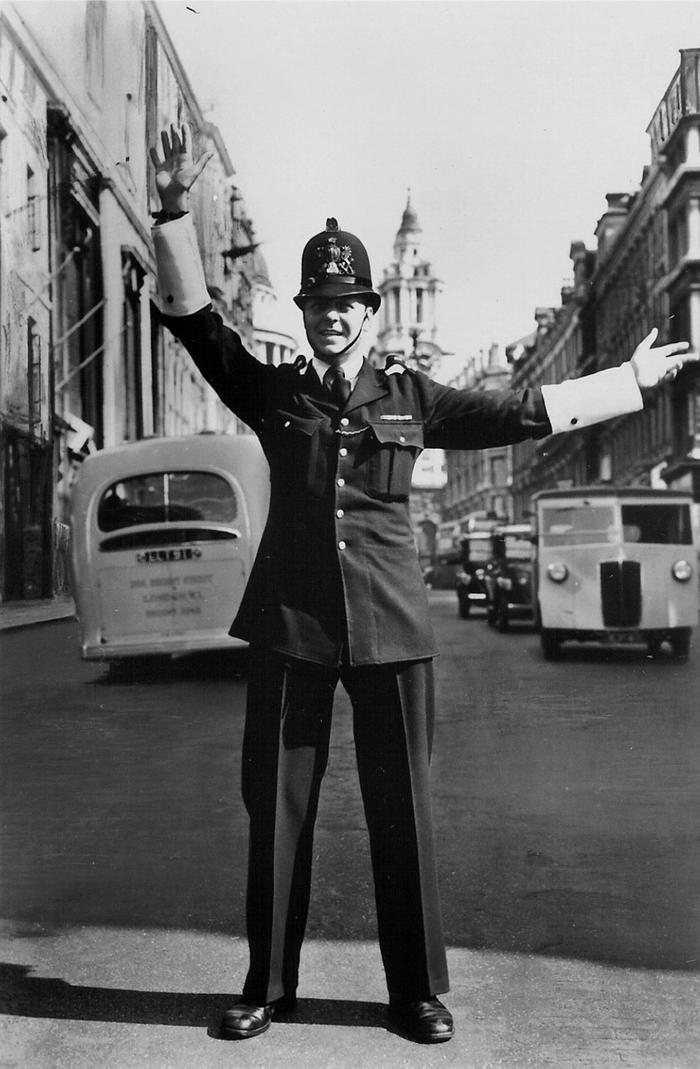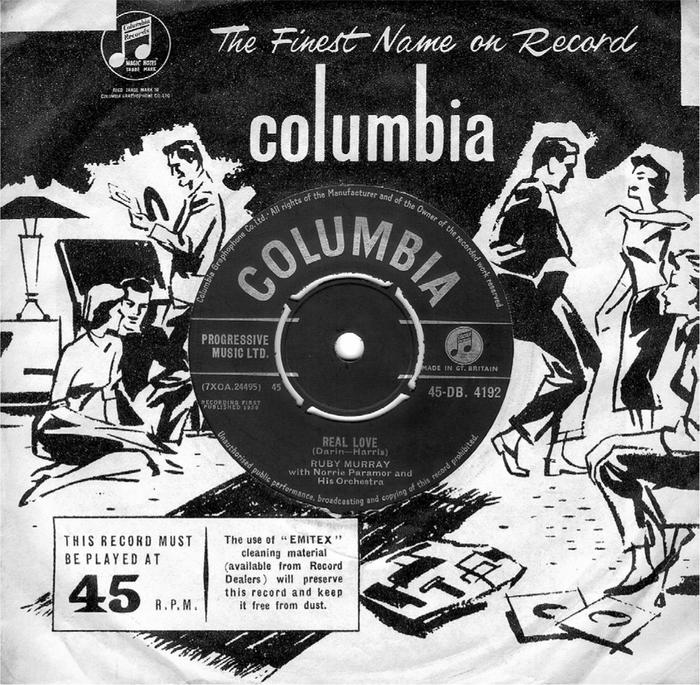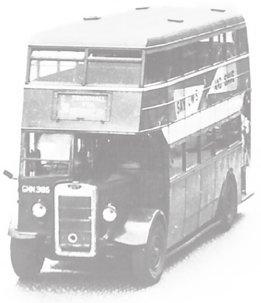A 1950s Childhood (18 page)
Authors: Paul Feeney

Billy Fury
. After achieving a handful of hit singles in 1959, Billy went on to have another twenty-three hit singles in the 1960s, but he suffered from heart problems and was forced to become much less active. Despite ongoing trouble with his heart, he continued to work through until his death in 1983. Sadly, on 27 January 1983, he collapsed after returning home from the recording studio, and died the next morning at the age of forty-two.
Bobbies on the
Beat.
In the 1950s, we were all used to seeing Bobbies walking the beat, but there are far fewer sightings of them nowadays. In the 1960s, in some suburban and rural areas, some were put into police ‘Panda cars’ to replace beat Bobbies, while in other areas the Panda cars worked alongside beat Bobbies. In the 1980s, it became common practice for the police to patrol in pairs, which again reduced the sightings of ‘Bobbies on the beat’ by half, and this figure was trimmed even further by the increased amount of time they had to spend doing paperwork at the
police station. But, there is hope for Londoners! In March 2009, the Metropolitan Police Commissioner, Sir Paul Stephenson, announced that he would be getting police officers to walk the beat on their own rather than in pairs, to double the number of patrols.
Bus
Conductors
.
The old-style double-decker buses that we were all familiar with required two-person crews to operate them, because the layout of the vehicle separated the driver from the passenger areas. Therefore, a conductor was needed to collect fares and to see passengers on and off the bus. Since the early 1970s, there has been a steady increase in newly designed ‘one-person operation’ buses that allow the driver access to the passenger area, and the ability to perform the tasks previously done by conductors. Conductor operation finally ceased in London in 2005.
Corporal Punishment in Schools
.
In 1986, physical punishment was abolished in all the UK’s state-run schools, and in 1998 it was outlawed in all independent schools.
Dave
King
.
In the 1960s, this popular ’50s entertainer went to the USA for a short period, after which he returned to England where he found that his style of comedy had fallen out of favour. He later became a television character actor. He died in 2002 following a short illness, at the age of seventy-three.
Diana
Dors.
She continued to star in films and appear in television dramas, comedies and game shows until shortly before her death in 1984. She died of cancer on 4 May aged fifty-two. Although she left clues to its whereabouts, the mystery of her missing
£
2 million fortune has never been solved. She is believed to have hidden it away in various bank accounts across Europe before she was taken ill.

A policeman on point duty directing traffic in London’s Ludgate Hill in the early 1950s.
Dickie Valentine
.
This very popular 1950s singer’s fame diminished in the 1960s, but he continued to perform until he died in a car accident in 1971, at the age of forty-one.
Free
School
Milk.
Abolished for seven- to eleven-year-olds in 1971 by Margaret Thatcher when she became Secretary of State for Education and Science, as part of Prime Minister Edward Heath’s spending cuts.
Gert
and Daisy
.
The popular female comedy duo, and sisters, Elsie and Doris Waters, created these two cockney characters. Elsie and Doris wrote all their own material, and their quick-fire comedy conversations of one-liners and comic songs kept everyone entertained throughout the 1930s, ’40s and ’50s, on both radio and gramophone record. In the 1960s, their popularity diminished, and they went into semi-retirement at their home in Sussex. They continued to do the occasional nostalgia shows until Doris fell ill in the 1970s. Doris died in 1978 (aged seventy-four), and Elsie died in 1990 (aged ninety-five).
Jimmy Clitheroe
.
He entertained us for forty years in every medium of show business, but is best known for his long-running radio show
The Clitheroe Kid
, which featured the diminutive Jimmy playing the part of a cheeky schoolboy. In his personal life he was a very private man, who lived a quiet life with his mother in a semi-detached bungalow in Blackpool. In June 1973, he sadly died from an accidental overdose of sleeping pills, on the same day as his mother’s funeral. He was fifty-one.
London
Pea-soupers
(Smog).
Anyone that lived in London during the 1950s will remember the dense fogs that would descend in the form of yellowish smog, caused by cold fog mixing with coal fire emissions. They were
called ‘pea-soupers’ because they had the consistency of thick pea soup, and many people died from the effects of breathing the smog. In 1956, the British government introduced the Clean Air Act and created smokeless zones in the capital. This reduced the sulphur dioxide levels to such a degree that London’s intense yellow smogs became a thing of the past.
Marty Wilde
.
The popularity of his singing style diminished in the 1960s with the arrival of new styles of music from the USA and the advent of the home-grown Merseybeat sound. Marty went on to influence and help his daughter Kim Wilde become a major international pop star in the 1980s. He has continued to write music and has established himself as a premier act on rock and roll nostalgia concert tours, which he still continues to do at the age of seventy.
Mr Pastry
(
Richard Hearne
).
He entertained us on BBC TV and on film for thirty years, and he was equally popular in the USA with frequent appearances on the
Ed
Sullivan Show
. His slapstick Mr Pastry comedy went out of favour in the 1960s, but he continued to do lots of charity work around London and near to his home in Kent. He was made president of the Lords Taverners charity in 1963, and was awarded the OBE in 1970 for his services to charity. It is rumoured that he was offered the role of Doctor Who when Jon Pertwee left the series in 1973, but Hearne wanted to play the part in the character of Mr Pastry, and the offer was withdrawn. He died in 1979 at the age of seventy-one.
Mrs Dale’s Diary
(
Radio Serial Drama
).
The comforting tales from Mrs Dale’s diary that were played out daily
on the BBC Light Programme since 1948 were considered to be too old fashioned for 1960s listeners, and in 1962 the format was changed and the series was renamed
The
Dales
. This helped to postpone its demise, but after having transferred to the newly created BBC Radio 2 in 1967, Mrs Dale was finally taken off-air in 1969.
National Service
(
Peacetime Conscription
).
In the 1950s, the thought of doing ‘National Service’ was on the mind of every young boy as they entered their teenage years. At the time, every healthy man between eighteen and twenty-one was expected to serve in the armed forces for two years, and remain on the reserve list for three and a half years. Call-up papers would arrive on or after one’s eighteenth birthday, but the obligation would cease after the age of twenty-six. National Service formally ended on 31 December 1960, but those who had deferred service, for reasons such as University studies or on compassionate grounds, still had to complete their National Service after this date.
Police Boxes
.
The old police boxes, once a familiar sight on city streets, with a few exceptions, were phased out from about 1969 in favour of modern portable telecommunications. Back in 1953, there were 685 of the easily recognisable blue police boxes on the streets of London.
Police Whistles
.
They were phased out during the late ’60s and early ’70s, when it was considered that the increase in traffic noise made them inaudible in urban areas. They were replaced by the early hand-held police radios.
Ruby Murray
.
Her successful 1950s hit record and film career ended at the start of the 1960s, but she continued to appear in cabaret and nostalgia shows around Britain until
shortly before her death in 1996. A compilation CD album of her hits was released in 1989, and an anthology triple CD album in 2005. Her name is still used in cockney rhyming slang to describe a curry, as in ‘a Ruby’ or ‘a Ruby Murray’. She died of liver cancer in December 1996 aged sixty-one in Torquay.

Real Love
was just one of many top twenty hit records that Ruby Murray had in the 1950s. It reached number 18 in the UK charts in December 1958.
Smith
’
s Crisps
(
with the little twist bag of
salt).
Now indirectly owned by the New York-based company, PepsiCo. Since the 1990s, the Smith’s crisps brands have
gradually been changed over to the Walker’s crisps brand, but there are still some out there.
Telegram Messenger Boys
.
These young boys in their navy blue uniforms and pillbox caps were familiar sights on our streets in the 1950s. The urgent messages they carried usually contained bad news, but they were a valuable service at the time. In the 1930s, 65 million telegrams were being delivered each year and the service employed 11,000 staff. In 1965, the number of telegrams delivered was down to 10 million. By 1976, most telegrams were being delivered by post, telephone or telex, rather than by hand. The continuing improvements in telecommunications eventually led to their demise, and in 1977 the Post Office decided to abolish the telegram service, although it lingered on until 1981.
Tommy Steele
.
In the 1960s he left his pop idol image behind and became successful in stage and film musicals, which he continued with for many years. He has performed less in recent years, with his last appearance being in his revival of
Scrooge, the Musical
at the London Palladium in 2005, when he was sixty-nine.
Tony Hancock
.
He continued to star in his own comedy TV series and appear in films well into the 1960s, but he suffered from alcoholism and depression for a long time. In 1968, he committed suicide by an overdose in a Sydney hotel room aged forty-three. At the time, he had completed only three programmes of a thirteen-part series that he was doing for Australian television called
Hancock Down Under.
Trolleybuses
.
These gradually ceased operation during the 1960s in favour of motorised buses. London saw the end of trolleybuses in 1962, and the last UK trolleybus service to stop operating was in Bradford in 1972.
Cover illustrations
: (front) a group of Glasgow children play in the street (Mary Evans Picture Library); (back, upper) a group of children enjoy a donkey ride at Weston-super-Mare, 1955 (author’s collection); (back, lower) a young boy playing in the street in central London (author’s collection)
First published 2009
Reprinted 2009 (three times), 2010
The History Press
The Mill, Brimscombe Port
Stroud, Gloucestershire,
GL
5 2
QG
www.thehistorypress.co.uk
This ebook edition first published in 2010
All rights reserved
© Paul Feeney, 2009, 2010
The right of Paul Feeney to be identified as the Author of this work has been asserted in accordance with the Copyrights, Designs and Patents Act 1988.
This ebook is copyright material and must not be copied, reproduced, transferred, distributed, leased, licensed or publicly performed or used in any way except as specifically permitted in writing by the publishers, as allowed under the terms and conditions under which it was purchased or as strictly permitted by applicable copyright law. Any unauthorised distribution or use of this text may be a direct infringement of the author’s and publisher’s rights, and those responsible may be liable in law accordingly.
ISBN
978 0 7524 6227 1

